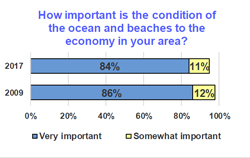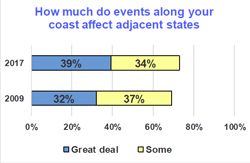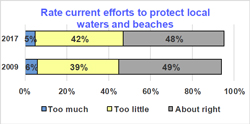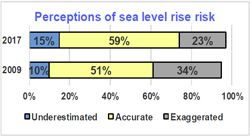Two survey reports released by the Monmouth University Polling Institute and the Urban Coast Institute (UCI) on Dec. 5, 2017 showed that citizens in the Mid-Atlantic region and coastal communities had a significant increase in concern for ocean health and the impact of oceans on the economy.
These reports were released simultaneously, and represented the first major report of regional public opinion regarding ocean health since 2009, consisting of two polls conducted in different populations.
Findings from the Mid-Atlantic region showed that 45 percent of respondents said not enough is being done currently to protect the oceans. Sixty-one percent have little to no confidence that the federal government will manage coastal issues adequately in the coming years.
Karl Vilacoba, UCI Communications Director, reported that of the two distinct polles, one was sent to residents of the six Mid-Atlantic states, from New York to Virginia, including Pennsylvania. The second poll was conducted in a population consisting of people specifically living coastal communities, which was defined as living within five miles of water.
The director of the Polling Institute, Patrick Murray, declined to comment for this story, after repeated attempts by the Outlook, and provided no reason for doing so.
The majority of residents also expressed that should federal funding for ocean health monitoring be cut, they would agree to state taxes being used instead, with 60 percent of residents indicating this as the best course of action.
The poll administered to residents of coastal communities showed that 95 percent of respondents believed that the oceans are at least somewhat important to local economies. Seventy-three percent recognized that local ocean health affects the coasts of other states.
 Additionally, 78 percent of residents were in favor of protecting areas of the ocean from coastal oil and gas drilling, while 68 percent would be willing to increase the amount they pay in taxes to increase efforts to protect the water and shoreline.
Additionally, 78 percent of residents were in favor of protecting areas of the ocean from coastal oil and gas drilling, while 68 percent would be willing to increase the amount they pay in taxes to increase efforts to protect the water and shoreline.
“A whole lot of the questions were duplicated from a survey that we did just like it in 2009. That way we can post them head to head and see how things have changed,” said Vilacoba.
Vilacoba cited a specific figure where in coastal communities, the amount of people in favor of offshore drilling dropped from 46 percent to 22 percent from 2009 to 2017.
“One of the things that first jumped off to me was the drop in approval for offshore drilling, and that turned out to be very timely,” said Vilacoba, “Looking back at 2009, that was really the low point in the Great Recession, so I would assume that people then were probably pretty desperate for any kind of economic spark.”
 “This region has been fairly consistent in opposing all offshore drilling,” said Tony MacDonald, Director of the Urban Coast Institute, “It doesn’t matter what political party you’re from, but I was surprised to see that [the percentage in favor] went down as much as it did.”
“This region has been fairly consistent in opposing all offshore drilling,” said Tony MacDonald, Director of the Urban Coast Institute, “It doesn’t matter what political party you’re from, but I was surprised to see that [the percentage in favor] went down as much as it did.”
Vilacoba also cited the increase in the call for government action in response to climate change as another factor that influenced the numbers, specifically people’s reaction to Hurricanes Irene and Sandy.
“Sometimes there’s sort of an anti-regulatory sentiment out there, but I think there was a pretty strong consensus that the government could actually do more,” said MacDonald. He also cited Hurricane Sandy as a major reason why residents are calling for government management to prepare for any future disasters.
 Vilacoba also noted that in both populations surveyed, majority of residents would allow their tax dollars to go to coastal maintenance efforts should the federal government fail allocate funds sufficiently. “Any time somebody tells you we’re willing to pay more in taxes to have [an effort] covered…it goes to that people feel very strongly about the role [oceans] play in our economy,” he said.
Vilacoba also noted that in both populations surveyed, majority of residents would allow their tax dollars to go to coastal maintenance efforts should the federal government fail allocate funds sufficiently. “Any time somebody tells you we’re willing to pay more in taxes to have [an effort] covered…it goes to that people feel very strongly about the role [oceans] play in our economy,” he said.
According to the findings, “nearly all Mid-Atlantic residents say it is either very (61 percent) or somewhat (29 percent) important for the government to collect information and maintain databases that track the health of the oceans.”
 Both MacDonald and Vilacoba were eager to underscore that this is an initiative that the UCI has been actively involved in as the project lead for the Mid-Atlantic Ocean Data Portal. The system tracks activity at sea, including human activity and natural phenomena, allowing for better understanding of ocean life and human interaction with the environment.
Both MacDonald and Vilacoba were eager to underscore that this is an initiative that the UCI has been actively involved in as the project lead for the Mid-Atlantic Ocean Data Portal. The system tracks activity at sea, including human activity and natural phenomena, allowing for better understanding of ocean life and human interaction with the environment.
“The results of this study are exciting for anyone in the environmental community. The changing opinion of coastal residents provides hope that concern for environmental issues will spread in America,” said junior Kaitlyn Smith, a marine and environmental biology and policy student. “Ultimately, the greater the support for environmental action the greater the action.”
According to MacDonald, the polls show a “broad general interest” in ocean health. “I still think we have a big challenge in educating the community about how ocean health impacts them in their daily lives.”
MacDonald explained that ocean health is not just an environmental issue, but rather enhances tourism, fishing, and beach access, among other economic benefits. The UCI, he says, will continue to empower communities to take action against climate change, help others understand the complex workings of ocean ecosystems, and support student research to drive political conversation in a productive direction.
PHOTO TAKEN by Kerry Breen
IMAGES TAKEN from the “Life on the Mid-Atlantic Coast” 2017 survey.
Editor’s Note:
A reader has brought to the attention of the paper that in last week’s front page story titled, University Institutes Publish Ocean Health Study, when the paper reported that the director of the Polling Institute declined to comment after repeated attempts and issued no reason for doing so, it might appear that the Institute was trying to cover up wrongdoing or ineptitude. To our knowledge at the paper neither of those conclusions would be the case. The Outlook merely meant what it wrote, that the director chose not to cooperate with the paper and discuss the role of the Institute insofar as it relates to the story. The paper regrets if any reader interpreted the statement otherwise. The Outlook would like readers to understand that the paper points out when sources decline to comment so that readers are aware that the reporters did their due diligence in pursuit of useful information and the absence of that source was not due to an oversight by the paper.




